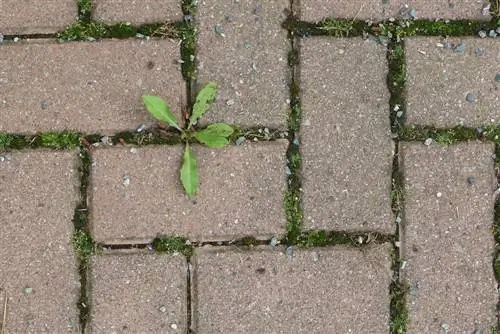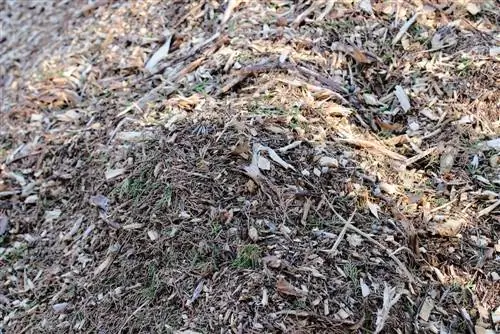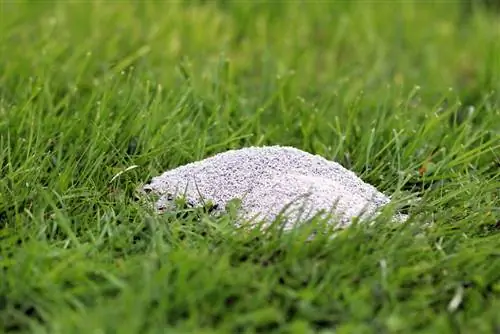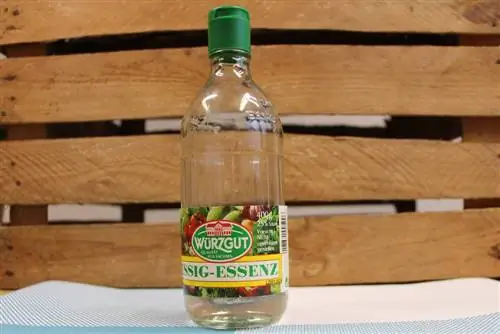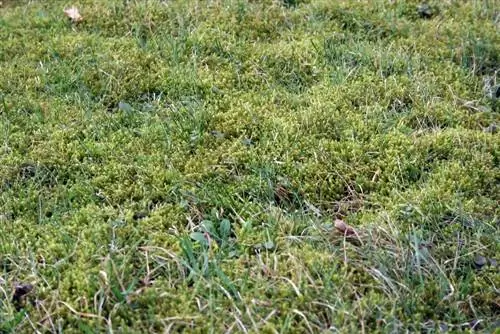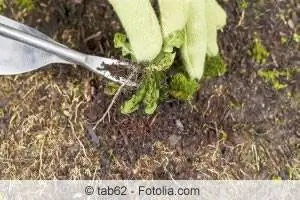- Author admin caroline@plants-knowledge.com.
- Public 2023-12-17 03:39.
- Last modified 2025-01-24 12:45.
There are a whole range of home remedies and insider tips that supposedly get rid of weeds once and for all. These include s alt, vinegar and even hydrochloric acid. It is true: the products destroy weeds. Unfortunately, they also damage other plants and can lead to significant soil changes. In the worst case, not only the weeds are dead, but the entire garden.
Hydrochloric acid
Dilute hydrochloric acid dissolves limescale from bathroom tiles and mortar residue from stones. It should also help against weeds in the garden. That's right, weeds can be effectively controlled with hydrochloric acid. It can also be obtained relatively cheaply in diluted form at any hardware store. However, when it comes to weed destruction, you should definitely stay away from it. The aggressive acid not only kills the weeds, but also other plants in the immediate area. Above all, it penetrates the soil and destroys the microorganisms it contains. It also changes the pH value depending on the concentration. Both can lead to long-term damage to soil quality. This is also why the use of hydrochloric acid in the garden is prohibited. Anyone who uses them anyway runs the risk of being hit with a hefty fine.
Saline solution
If hydrochloric acid is not allowed in the garden, it might be a good idea to combat weeds with a s alt solution. After all, both are not the same. It's just stupid that s alt or a s alt solution works effectively against weeds, but also attacks other plants. In addition, both variants have a significant impact on the pH value of the soil. The use of s alt or a s alt solution in the garden is therefore prohibited and is subject to high fines. The legislature is primarily concerned with the long-term protection of the natural foundations of life. Garden owners should always be aware that s alt not only affects weeds, but also other plants. It dissolves in moist soil and spreads over a relatively large area - even when used specifically.
Vinegar
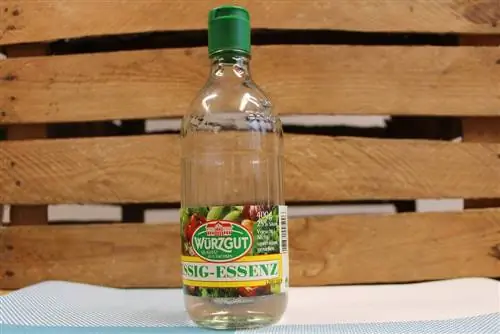
In addition to hydrochloric acid and s alt, vinegar is also repeatedly mentioned as a reliable and effective home remedy for combating weeds, unwanted bamboo and wild ivy. But the same applies to vinegar: Yes in the kitchen, no in the garden. Acetic acid is generally permitted as a pesticide, but only in certain concentrations and no more than twice a year. The vinegar solution penetrates the plant through the cell membranes and causes it to die. However, the plants in the immediate vicinity are also affected. And the soil also suffers from an undesirable change in pH for the worse. That's why you should definitely stay away from vinegar to combat weeds. What is touted as a tried and tested home remedy usually causes more harm than good.
Tip:
If vinegar or acetic acids are to be used to combat weeds, then you should only use ready-made mixtures from specialist retailers. A home-made vinegar solution is an illegal pesticide.
Alternatives
If the home remedies hydrochloric acid, s alt and vinegar are so problematic and usually forbidden when it comes to destroying weeds in the garden, the question naturally arises as to what alternatives there could be. These actually exist - but they always involve work and a relatively high expenditure of time. Two variants have proven to be really effective solutions against weeds. On the one hand, there is tearing out by hand. On the other hand, weeds can also be specifically destroyed with fire or a gas burner.
Rip away
It is a very laborious, but also a very effective way of controlling weeds. It is particularly recommended if there are other desired plants in the immediate vicinity of the weed. There is actually no way around this method, especially in vegetable beds, flower beds and lawns. The weeds must always be removed with the entire root and, ideally, disposed of in the garbage can. By the way, scraping out the joints between paving stones is nothing more than tearing them out. Here too, the unwanted plant growth is completely scraped out along with the roots.
Burn down
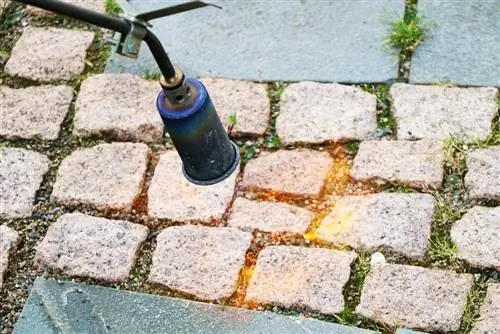
Weeds that have spread on garden pavements, walls, path borders and paths are best combated with fire. To do this, get a gas burner from the hardware store. With it, the entire plant is literally torched. However, it is important that the method is only used if there are no flammable materials in the immediate vicinity, otherwise there is a significant risk of fire. This variant also requires some patience. It is not enough that the visible parts of the plant are burned. Rather, you should hold the burner in one place on the affected area for longer in order to be able to destroy the roots underneath.
Weed?
Some hobby gardeners tend to have a garden that has to be so clean and tidy that it actually has nothing to do with nature. Yes, weeds are annoying and can, under certain circumstances, affect the growth of desired plants. But so-called weeds are also part of nature. It doesn't always have to be a swept-clean garden. You can also enjoy a so-called wild garden. Then the weeds won't bother you, you can save having to fight them or at least reduce them to an absolute minimum.
Responsibility
Anyone who still feels compelled to fight weeds, bamboo and ivy should always do so with the greatest possible responsibility. S alt and vinegar are touted as home remedies. This suggests that this is a completely natural way of controlling weeds. As we have seen, the consequences can still be dramatic. The situation is very similar with artificially produced hydrochloric acid. Anyone who sees their garden as a natural habitat will avoid these products if possible - in their own interest. And of course he will also adhere to the legal requirements, which have not been established without reason. There is no one miracle cure for weeds.

